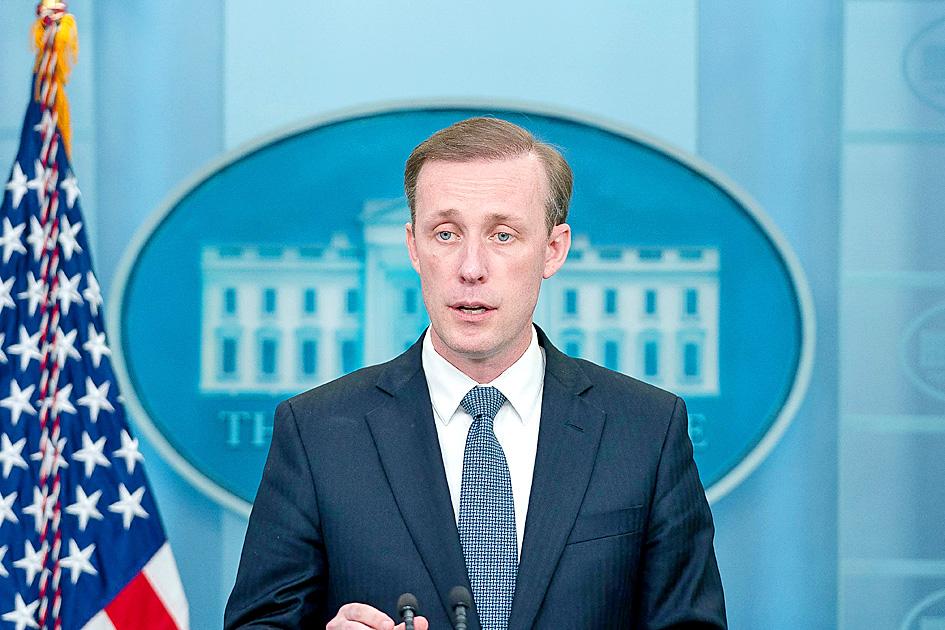US President Joe Biden is expected to unveil a list of nations today who would be joining a long anticipated Indo-Pacific region trade pact, but Taiwan will not be among them.
US National Security Adviser Jake Sullivan said that Taiwan is not among the governments included in the launch of the Indo-Pacific Economic Framework, a trade pact that is meant to allow the US to work more closely with key Asian economies on issues including supply chains, digital trade, clean energy and anticorruption efforts.
The US president is scheduled to highlight the launch of the framework as he meets with Japanese Prime Minister Fumio Kishida today.

Photo: AFP
“We are looking to deepen our economic partnership with Taiwan, including on high technology issues, including on semiconductor supply, but we’re pursuing that in the first instance on a bilateral basis,” Sullivan said.
The framework is meant to establish Biden’s economic strategy for the region.
Matthew Goodman, senior vice president for economics at the Center for Strategic and International Studies in Washington, said that some Pacific signatories are likely to be disappointed, as the pact is not expected to include provisions for greater access to the US market.
“I think a lot of partners are going to look at that list and say: ‘That’s a good list of issues. I’m happy to be involved, but, you know, are we going to get any tangible benefits out of participating in this framework?’” said Goodman, a former director for international economics on the US National Security Council during former US president Barack Obama’s administration.
Beijing has criticized the US effort to form the trade pact.
“We hope they will build an open and inclusive circle of friends in Asia-Pacific, rather than an exclusive clique, and do more for peace and development rather than creating turmoil and chaos in the region,” Chinese Ministry of Foreign Affairs spokesman Wang Wenbin (汪文斌) said.
The Ministry of Foreign Affairs yesterday expressed regret over Taiwan’s exclusion from the first round of IPEF members.
As an important economy, Taiwan plays a crucial role in the global supply chain and definitely qualifies for IPEF membership, it said, adding that the government would continue to seek new opportunities to join the pact.
Additional reporting by staff writer

A Ministry of Foreign Affairs official yesterday said that a delegation that visited China for an APEC meeting did not receive any kind of treatment that downgraded Taiwan’s sovereignty. Department of International Organizations Director-General Jonathan Sun (孫儉元) said that he and a group of ministry officials visited Shenzhen, China, to attend the APEC Informal Senior Officials’ Meeting last month. The trip went “smoothly and safely” for all Taiwanese delegates, as the Chinese side arranged the trip in accordance with long-standing practices, Sun said at the ministry’s weekly briefing. The Taiwanese group did not encounter any political suppression, he said. Sun made the remarks when

The Taiwanese passport ranked 33rd in a global listing of passports by convenience this month, rising three places from last month’s ranking, but matching its position in January last year. The Henley Passport Index, an international ranking of passports by the number of designations its holder can travel to without a visa, showed that the Taiwan passport enables holders to travel to 139 countries and territories without a visa. Singapore’s passport was ranked the most powerful with visa-free access to 192 destinations out of 227, according to the index published on Tuesday by UK-based migration investment consultancy firm Henley and Partners. Japan’s and

BROAD AGREEMENT: The two are nearing a trade deal to reduce Taiwan’s tariff to 15% and a commitment for TSMC to build five more fabs, a ‘New York Times’ report said Taiwan and the US have reached a broad consensus on a trade deal, the Executive Yuan’s Office of Trade Negotiations said yesterday, after a report said that Washington is set to reduce Taiwan’s tariff rate to 15 percent. The New York Times on Monday reported that the two nations are nearing a trade deal to reduce Taiwan’s tariff rate to 15 percent and commit Taiwan Semiconductor Manufacturing Co (TSMC, 台積電) to building at least five more facilities in the US. “The agreement, which has been under negotiation for months, is being legally scrubbed and could be announced this month,” the paper said,

MIXED SOURCING: While Taiwan is expanding domestic production, it also sources munitions overseas, as some, like M855 rounds, are cheaper than locally made ones Taiwan and the US plan to jointly produce 155mm artillery shells, as the munition is in high demand due to the Ukraine-Russia war and should be useful in Taiwan’s self-defense, Armaments Bureau Director-General Lieutenant General Lin Wen-hsiang (林文祥) told lawmakers in Taipei yesterday. Lin was responding to questions about Taiwan’s partnership with allies in producing munitions at a meeting of the legislature’s Foreign Affairs and National Defense Committee. Given the intense demand for 155mm artillery shells in Ukraine’s defense against the Russian invasion, and in light of Taiwan’s own defensive needs, Taipei and Washington plan to jointly produce 155mm shells, said Lin,